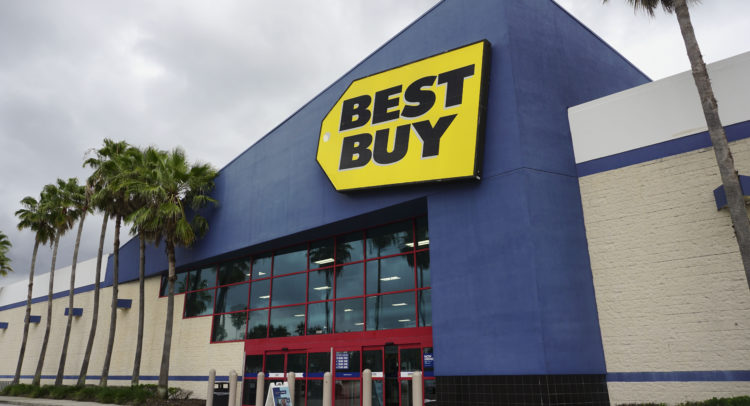Sometimes, you can still win by losing, as massive electronics retailer Best Buy (BBY) discovered after the release of its earnings report. The company added 5.2% in premarket trading on Tuesday after its earnings report was released.
It has given back most of those gains, as it is up only 1%. However, its performance is relatively good considering that the S&P 500 ETF (SPY) is currently down 1.5%. The news therein was not as grave as previously feared.
So, is it time to buy in on Best Buy? Right now, I’m shifting to neutral. The company is indeed doing well, but the risks are so undeniable that even the company itself won’t try to deny them.
The last 12 months for Best Buy have been mainly downhill. Aside from a brief surge ahead of the holiday shopping season, where the company traded above $135 per share for a little while, the company has been on a generally downward trend for the last 12 months. It was a fairly slow downhill trend until just recently, though.
The latest news proved to be all Best Buy investors needed to pile on. The company posted slightly lower than expected earnings, coming in at $1.57 per share against Refinitiv’s call for $1.61 per share. Revenue, meanwhile, proved better than expected. It came in at $10.65 billion against Refinitiv’s call for $10.41 billion.
Perhaps worse is that same-store sales were down around 8% against this time last year. That still beat FactSet’s estimates calling for a drop of 8.6%, but it’s a drop nonetheless. The company also cut back on its full-year outlook. It cited the inflationary pressures that are hitting much of the retail market right now.
Wall Street’s Take
Turning to Wall Street, Best Buy has a Moderate Buy consensus rating. That’s based on six Buys, seven Holds, and one Sell assigned in the past three months. The average Best Buy price target of $110.92 implies 51.9% upside potential.

Analyst price targets range from a low of $80 per share to a high of $144 per share.
Investor Sentiment is as Mixed as Earnings
Best Buy is on thin ice with some investors and analysts. The company currently has a Smart Score of 4 out of 10 on TipRanks, which is the lowest level of “neutral,” just above “underperform.” It’s more likely at this point to lag the broader market than it is to surpass it. Investors, therefore, should be expected to have wide-ranging opinions on Best Buy stock overall. That’s just what we’ll find with a look at investor sentiment.
The biggest measure is hedge fund involvement. Based on word from the TipRanks 13-F Tracker, hedge funds once again cut their involvement in Best Buy stock. The cut was hardly extensive; hedge funds dropped from just under 206,000 shares in December 2021 to just over 187,500 shares in March 2022. However, both figures are lower than the peak of just under 1.747 million back in December 2020.

Insider trading is a different matter. In the last three months, BBY insiders sold off $7.6 million in shares. However, buy transactions led sell transactions by 20 to 16. The month of April saw no transactions recorded at all. Going back to the last 12 months, sell transactions took an edge over buy transactions, coming in at 37 sells to 32 buys.
As for retail investors who hold portfolios on TipRanks, those are on the rise. In the last seven days, TipRanks portfolios with Best Buy in them were up 1.5%. In the last 30 days, that rise swells to 2.4%.
Finally, there’s Best Buy’s dividend history. The dividend history behaves just how an income investor would hope for, with regular payouts and just as regular increases.
The increase was smaller between December 2019 and March 2020 than it was between December 2020 and March 2021, but it was present. Another increase hit with the March 2022 dividend payout.
Some Retail is Worse Off than Others
Best Buy is likely to take a hit from an upcoming recession. It’s also already taking hits from growing inflation, which is a drag on discretionary income. Since Best Buy depends so heavily on discretionary income—few are going to buy a new television in such a climate unless their old one dies unexpectedly—such an environment inevitably hurts the company.
Worse, the environment isn’t great for Best Buy right now for other reasons. A lack of discretionary income is a problem, certainly. However, there are also a few major technological moves for Best Buy to take advantage of.
The newest generations of video-game consoles have been out for almost two years. Though it’s still a challenge to find an Xbox One X or PlayStation 5, many who have sought the systems already have what they came for.
There are no new home entertainment formats, either; no jump from DVD to Blu-ray is on the horizon, thanks to the substantial growth of streaming media.
Plus, shoppers already stocked up on what they needed in their home entertainment gear back in 2020, when the pandemic kept so many people at home. Much of that is likely still serviceable, which reduces the need for replacements.
Basically, Best Buy is about to enter a major technological lull right in the middle of a massive inflationary period. Both of these add up to bad news for an electronics retailer. Its market will now be made up of replacements, occasional repairs, and a few late-to-the-party upgraders.
Here’s the key point, though: this too shall pass. In all likelihood, the recession will come and probably go. Some believe that this recession will be different and will cripple the landscape so extensively that there will be no recovery. However, they believed much the same thing in 2008 as well.
While certainly, the notion of a recession going into a depression is always possible, it’s generally unlikely. Prepare accordingly, certainly, but also be ready for the possibility that this is just more of the same.
Concluding Views
It’s not a good time to be a retailer right now. Especially a retailer of big-ticket, high-dollar items that were recently replaced during an unexpected refresh cycle a couple of years ago. That’s going to hurt Best Buy in the short term. It’s not likely to remain hurt forever, though. Moreover, Best Buy is trading below its lowest targets right now. That’s tempting for investors.
With the larger environment being what it is, though, it may be a better plan to wait. Hold off a bit; let the recession start to smooth itself out, and then see what Best Buy has to offer. Investors make money in recessions, too. A better entry point may arrive in mere weeks.
Discover new investment ideas with data you can trust.
Read full Disclaimer & Disclosure









